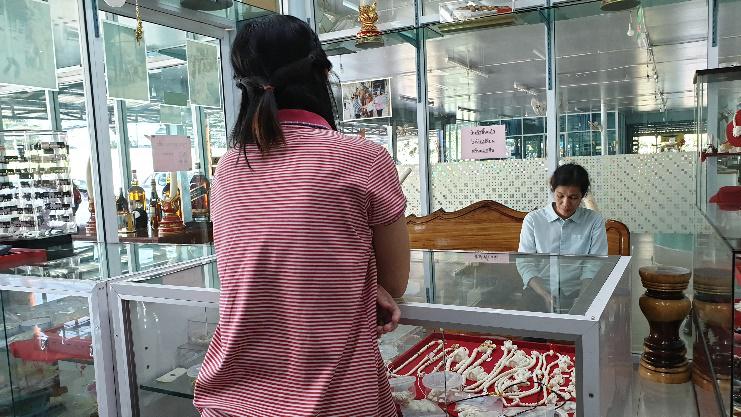Apinya Chaitae
A well-regulated, legal trade in ivory may provide conservation benefits by crowding out illegal or unsustainable trading in ivory. The legal trade of ivory in Thailand is restricted to ivory from local domesticated elephants. This project will explore the sustainability of this controversial trade with the following aims:
1. To understand the ivory market chain and related factors influencing ivory supply.
2. To estimate the potential amount of ivory produced from domesticated elephants in Thailand

Interviews with ivory sellers.
In Thailand, registered privately-owned, elephants have been legally categorised as draught animals. Ivory obtained from these domesticated elephants has been historically used and traded without comprehensive controls, leading to the laundering of illegal African ivory in the Thai domestic trade. This problem was addressed by legislative reform in 2015. The reforms imposes control measures to regulate the domestic ivory trade. The Elephant Ivory Act 2015 requires ivory possessors to register ivory in their possession, and establishes trade control mechanisms to regulate the trade in local ivory sourced from the domesticated Thai elephants. As the legal trade of Thai ivory can only be sourced from domesticated elephants in Thailand, knowledge of the ivory supply is needed, but to my knowledge has not been quantified.
This project will explore the sustainability of the legal ivory trade in Thailand by providing important information on the supply of locally-sourced elephant ivory in Thailand. The study will be mainly conducted using two methods: qualitative research and document analysis. For the qualitative research, a preliminary legal market chain model had been developed which comprises of three stages: source, manufacturing and consumption. To update the chain, semi-structured interviews with open-ended questions will be employed with key stakeholders i.e. elephant owners/middlemen and ivory traders/manufacturing shops/carvers, to track the flow of ivory tusks into the manufacturing process. While document analysis will be used to quantify the amount of ivory produced from domesticated elephants in Thailand. The ivory supply will be estimated on the basis of:
(1) the number of registered domesticated elephants;
(2) better understanding of the practices of harvesting ivory from these animals;
(3) the proportion of the registered ivory coming onto the market from these animals, which can be drawn from the government records.
This research will enable an estimation of the potential volume of Thai ivory supply which is crucial for an assessment of the feasibility of having a sustained domestic ivory market. In addition, knowledge of the ivory market chain should provide better understanding of the links from production to consumer sales of ivory, as well as potential factors or mechanisms that influence supply. These findings will be beneficial for management of the domestic ivory trade in Thailand, and guide priorities for law enforcement for the conservation benefits of elephants.